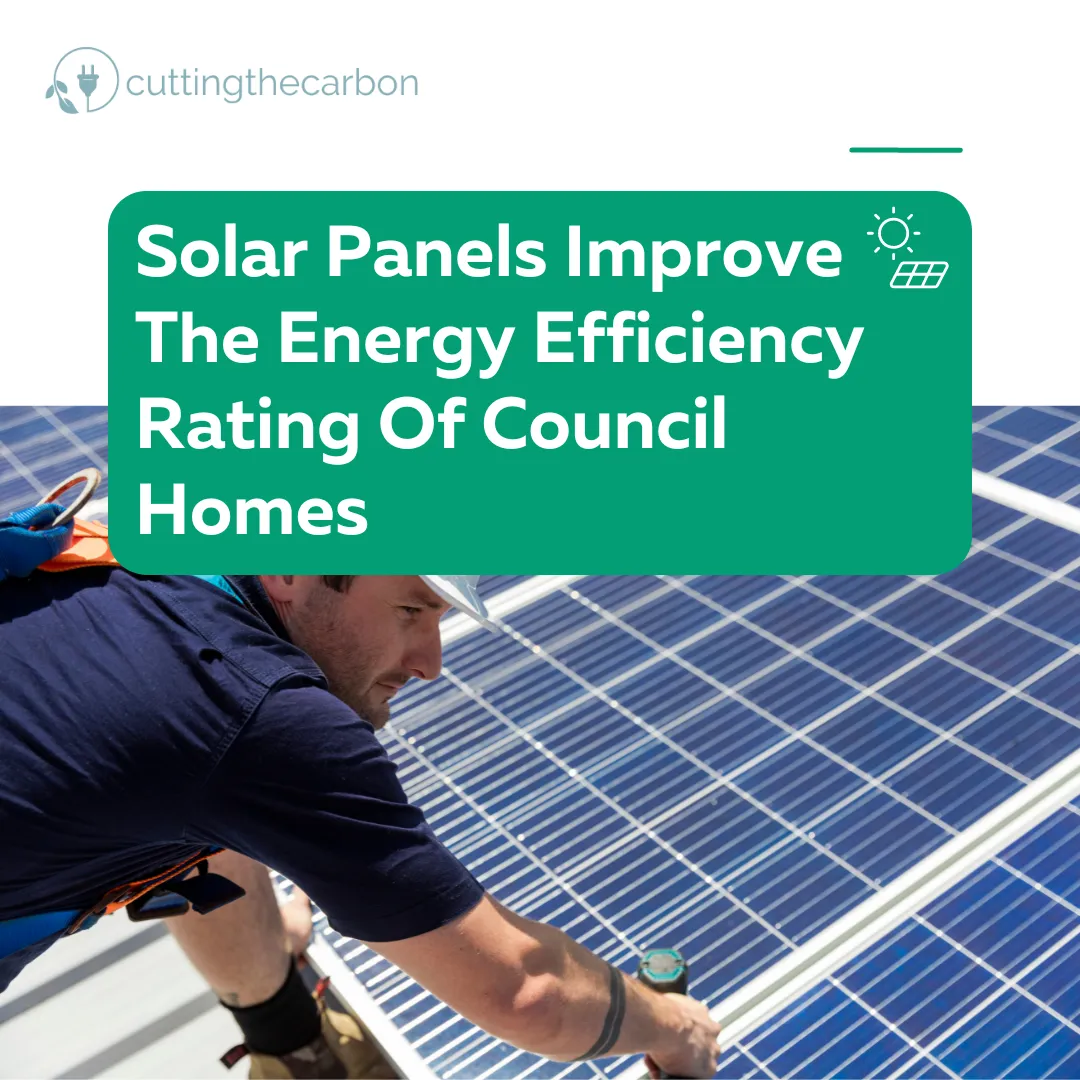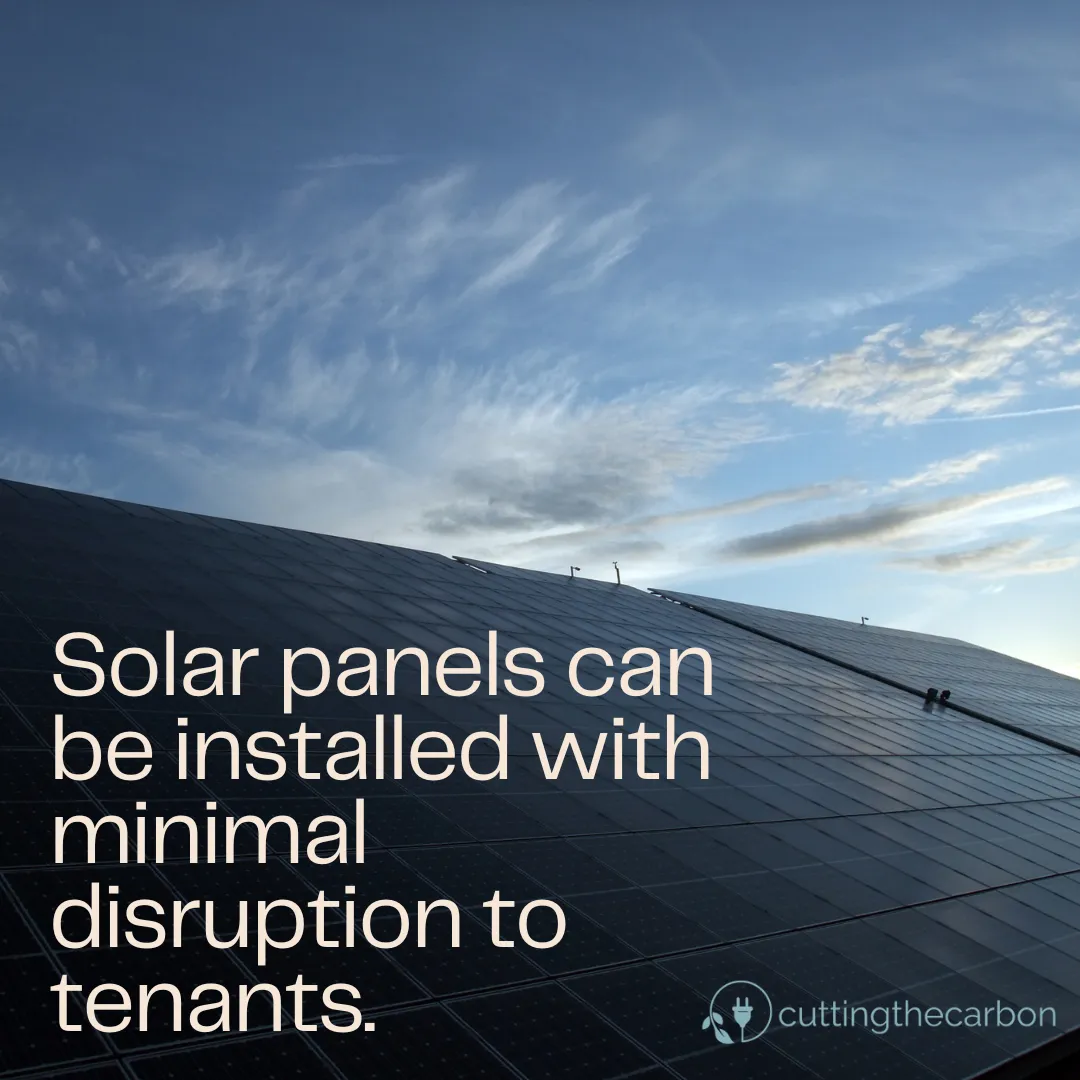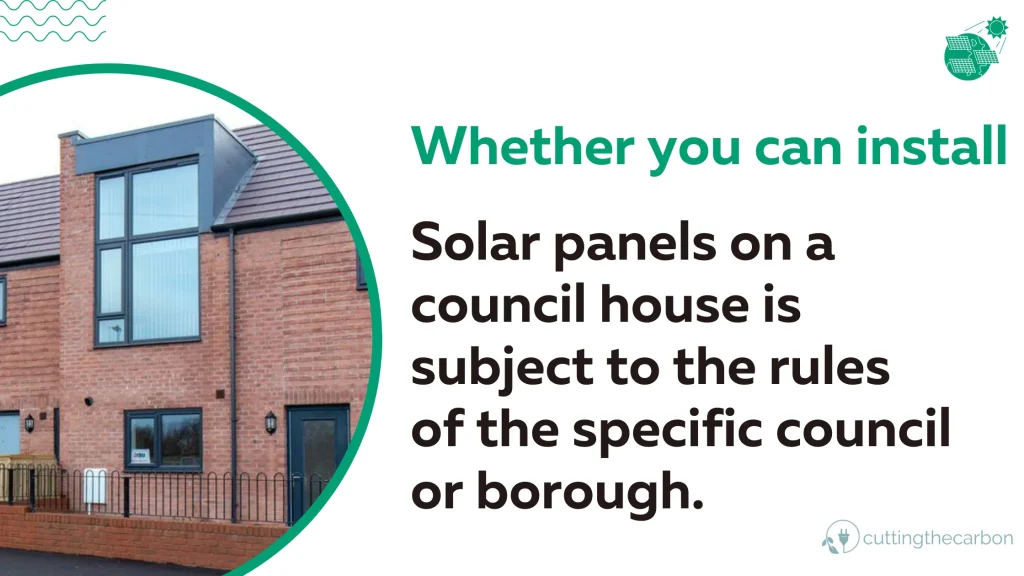Harnessing the sun’s power has never been more achievable than today, especially for council houses.
Installing solar panels on council homes presents many benefits for tenants and the environment, making it an essential consideration in the push for greener living.
Here, we will explore the advantages of solar panels on council houses, the installation process, and alternative solar schemes that offer cost-effective solutions.
Are you ready to join the solar revolution and make a difference in your life and the world around you?
Short Summary
- Harnessing solar energy provides various benefits to council housing tenants and the environment, such as free electricity, lower bills and reduced carbon emissions.
- Solar panel installation involves eligibility assessment, home evaluation and tenant opt-out options.
- The UK government is progressing towards their goal of 800k homes with solar panels by 2024 to become carbon neutral by 2030.
Benefits for Tenants and the Environment
Installing solar panels on council houses has many advantages for tenants and the environment. From free electricity to lower energy bills, solar panels provide immediate and long-lasting benefits for households and contribute to a greener, more sustainable future.
Let’s explore these perks in more detail and discover how solar energy is a game-changer for council housing.
The table below summarises the considerations and steps involved in installing Solar Panels on Council Houses
| Consideration/Step | Explanation |
|---|---|
| Approval from Local Authority | The ability to install solar panels on a council house is subject to the rules of the specific council or borough. Some local authorities are proactive in adding solar panels to new council properties, while others extend the opportunity to existing tenants. |
| Government Scheme | The financial implications of installing solar panels on a council house depend on the district in which you reside. Some councils offer solar panels free of charge, while others provide them at a reduced cost. The landlord or council will be responsible for the installation and upkeep of the panels. |
| Eligibility Criteria | The prerequisites for installing solar panels on a council house differ from one council to another. An assessment of your property will be required to determine its suitability. This includes evaluating the robustness of the roof, the direction the property faces, the size and angle of the roof, how accessible the property is, and whether the local electricity grid has enough capacity. |
| Expense | The financial implications of installing solar panels on a council house are dependent on the district in which you reside. Some councils offer solar panels free of charge, while others provide them at a reduced cost. The landlord or council will be responsible for the installation and upkeep of the panels. |
| Advantages | If the cost is affordable – or if the council can install the panels at no cost – the benefits of solar panels are substantial. They can drastically lower household energy expenses and prevent up to 0.9 tonnes of CO2 from being released into the atmosphere annually. |

Free Electricity
Imagine a world where you don’t have to worry about your electricity bills, where the energy to produce electricity you consume is generated at no cost.
This is the reality for tenants in council homes with solar panels installed. Harnessing the sun’s rays, solar panel systems generate electricity that can be used by tenants free of charge.
Even when a tenant decides to purchase their council house, they will continue to enjoy the free electricity generated by the property and solar panel system.
The national grid steps in for any electricity consumption beyond the solar panel system’s capacity, and tenants can pay for the extra electricity using their regular payment methods.
Lower Energy Bills
The benefits of solar panels extend beyond free electricity. Tenants can also enjoy reduced energy bills, a lifesaver for low-income households. With solar panels installed, households can save up to £150 per year on fuel bills.
When a solar PV system is in place, the average annual energy bill savings can amount to an impressive £534.
These savings contribute to a more affordable and sustainable living situation for council house tenants while reducing their carbon footprint.
Give our free carbon footprint calculator a try. It offers a simple, behaviour-influenced assessment of the CO2 emissions a person creates over a year.
Environmental Impact
By installing solar panels on council houses, we are taking a significant step towards mitigating climate change and preserving our environment. Solar panels reduce carbon emissions by generating clean, renewable energy.
It is estimated that 300 tonnes of carbon emissions will be reduced annually by solar panel installations on council homes.
Any surplus electricity generated by the panels is exported to the national grid, contributing to a greener energy sector. In essence, solar panels on council homes benefit tenants and help protect our planet for future generations.
Here is a table summarising the current solar panel installation statistics for the UK:
| Statistic | Value |
|---|---|
| Global solar capacity (2020) | 716.2 gigawatts (GW) |
| UK’s solar capacity | 14.6 GW |
| Number of solar sites in Cornwall (best place in the UK for solar) | Approximately 8,076 |
| Total number of UK homes with solar panel installations (2020) | Approximately 970,000 |
| Percentage of UK’s renewable energy that is solar | 6.8% |
| New solar PV capacity installed in the UK (2021) | 0.73 GW |
| Number of solar farms operating in the UK | Just under 500 |
The Solar Panel Installation Process
Before tenants can enjoy the benefits of solar panels, several steps are involved in the installation process. From assessing eligibility to evaluating the property’s suitability, the journey to solar-powered living requires careful planning and execution.
This section will outline the solar panel installation process for council houses, ensuring a smooth transition to a more sustainable and eco-friendly lifestyle.
Assessing Eligibility
Various factors must be considered to determine if a council house is eligible for solar panel installation. These include the property’s location, roof orientation, shading, and energy consumption.
Meeting specific criteria, such as properties having a suitable roof orientation, adequate shading, and an acceptable energy consumption level, is essential for a successful solar panel installation. Failure to comply with eligibility requirements may mean missing out on the benefits of solar panels.
Checking eligibility with the local council is recommended, as requirements may vary.
Home Assessment
Once eligibility is confirmed, a thorough home assessment is necessary to ensure the property is suitable for solar panel installation. This assessment includes evaluating the roof’s orientation, angle, shading, and structural integrity.
A full roof condition survey is required to guarantee the rooftop can support the solar panel system.
A comprehensive home assessment can identify and address potential issues before the installation begins, ensuring a seamless transition to solar-powered living.

Installation and Opt-Out Options
The installation process for solar panels typically takes around two days. It involves setting up scaffolding, affixing roof anchors, fitting mounts, installing the panels, connecting electrical wiring, linking the solar inverter to the system, connecting the solar inverter to the power grid, and activating the solar inverter.
Some people have asked whether you can install solar panels yourself. Read our guide to DIY solar panel installation to learn more.
Although the process is generally not disruptive, tenants can decline to have solar panels installed on their homes if they prefer not to participate in the scheme.
Alternative Solar Panel Schemes
While the solar panel schemes mentioned thus far offer numerous benefits, alternative options are available for those seeking more cost-effective solutions.
By exploring schemes like ECO4, the Solar Together Initiative, and comparison tools, it is possible to find affordable solar panel installations without compromising quality or environmental impact. Octopus energy currently offers solar panel installations worth considering, as you could save 90% on your electricity bills.
The following sections will explore these alternative solar panel schemes and discover how they can contribute to a more sustainable, cost-effective future.
ECO4 Scheme
The ECO4 Scheme is a government initiative designed to enhance the energy efficiency of UK households through free boiler and insulation grants. As part of this scheme, households can benefit from solar PV panels, reducing emissions, electricity costs, and energy bills.
To qualify, specific criteria must be met, including excluding a biomass boiler or District Heat Network tariff. By participating in the ECO4 Scheme, households can access a more affordable and environmentally friendly solution for their energy needs.
Solar Together Initiative
The Solar Together Initiative is a group-buying program that connects households and local governments to obtain high-quality solar panels at a cost-effective price.
Implemented in various locations throughout the UK, such as London, Suffolk, and Hampshire, the Solar Together Initiative enables neighbours to purchase and install solar panels collectively, leading to significant cost savings.
The initiative provides access to affordable solar panels and contributes to reducing energy bills and carbon emissions while providing a source of free electricity.

Comparing Quotes
Quote comparison tools can be highly beneficial when searching for the best solar panel installation deals.
These tools enable households to evaluate quotes from various solar panel installers and determine the most suitable option for their requirements.
By comparing costs, equipment, warranties, and installation services equally, households can find the most cost-effective and efficient solution for their solar panel needs.
Additionally, reading reviews and obtaining references from previous customers can help ensure the reliability and trustworthiness of the chosen company.
Progress and Future Goals
The UK government has set ambitious targets for solar panel installations on council houses, aiming for 800,000 homes to be equipped with solar panels by 2024. 170,000 council homes have installed solar panels, demonstrating significant progress towards this goal.
Furthermore, councils are striving to become carbon neutral by 2030, showcasing their commitment to environmental sustainability. This section will discuss the current progress and future goals of solar energy in council housing and the broader energy sector.
Government Targets
While there is no specific target for solar energy, the UK government aims to increase offshore wind capacity to 50GW by 2030. This ambitious goal demonstrates the government’s commitment to renewable energy and reducing carbon emissions.
A UK trade group has also called for government support to triple the nation’s solar power capacity over the next decade to help meet climate objectives. These targets highlight the potential of solar energy to contribute to a greener, more sustainable future.
Current Status
Solar energy is a rapidly growing source of electricity worldwide. During the first nine months of 2022, solar photovoltaic installations significantly increased in countries like China and India. As of November 30th, 2022, solar power installed capacity has reached approximately 61,97 GW.
In the context of council and social housing, 170,237 social houses have had solar panels installed, showcasing notable progress towards the government’s target of 800,000 homes by 2024.
Moreover, all newly constructed council homes are being outfitted with solar panels, further emphasizing the commitment to sustainable living.
Carbon Neutral Pledge
The carbon-neutral pledge for solar energy is a commitment to offset the carbon emissions produced during the manufacturing and installation of solar panels with additional offsets that are quantifiable, real, permanent, and socially beneficial.
By achieving net-zero annual carbon emissions, the carbon-neutral pledge offers numerous advantages, such as decreasing the ecological effects of solar panel installation, aiding in attaining government objectives for carbon emissions and providing a more viable energy source.
The fulfilment of this pledge ensures a brighter, greener future for all.
Walking On Solar Panels On Your Roof: A Word of Caution
While you might technically be able to tread on solar panels, it’s highly discouraged due to associated safety hazards and the potential for damaging the panels.
Walking on the panels could invalidate the warranty and negatively impact the performance and longevity of the solar power PV system. It’s essential to bear in mind that solar panels are engineered to absorb sunlight efficiently, not to withstand the weight and movement of people.
Summary
Installing solar panels on council houses presents many benefits for tenants and the environment, including free electricity, lower energy bills, and reduced carbon emissions.
The solar panel installation process, alternative solar schemes, and the progress towards government targets all contribute to a more sustainable and eco-friendly future for council housing.
By embracing solar energy and implementing these initiatives, we can work together to create a cleaner, greener world for future generations.
Now is the time to seize the sun’s power and transform how we live and thrive in our council homes.
Frequently Asked Questions
Are you allowed to put solar panels on a council house?
Whether or not you can install solar panels on a council house depends on the specific regulations of your local council.
To ensure that you remain in line with all applicable laws, we recommend contacting your local council to find out if you’re eligible for free solar panel installation.
Can I get solar panels on benefits?
It is possible to afford to get solar panels on benefits. Government schemes like the Feed-in Tariff and the Energy Company Obligation have been set up to provide funding assistance to households on certain benefits.
These schemes are designed to make solar energy more accessible and affordable for those who may not have the financial means to purchase solar panels outright.
Can I have solar panels as a tenant?
You should check with your landlord before installing solar panels as a tenant. If you own or lease a flat but not the building itself, you must get permission from the relevant authorities, such as the building management company.
In either case, ensuring that all parties involved are happy with the proposed installation is important.

